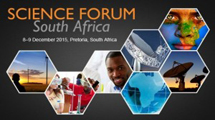By Minister Naledi Pandor
I have convened, for today and tomorrow, in Pretoria, the first “Science Forum South Africa” (SFSA)
It is designed as a “public science” event open to all interested stakeholders, to provide a platform for discussion and debate on the role of science in South African, African society as well as globally.
The programme is bringing together more than 1 500 participants for discussion and debate in four plenary sessions, 32 (parallel) short seminars and 18 individual lectures - labelled “Science talks.” The Science Forum will also include an exhibition and public outreach activities.
The opening plenary session will include remarks by the African Union’s Commissioner for Science and Technology, Japan’s renowned Science and Technology in Society Forum’s Koji Omi, and Prof Salim Abdool Karim, internationally acclaimed for his work in the fight against HIV-AIDS.
With the international negotiations on the United Nations Framework Convention on Climate Change in Paris enjoying huge public attention, the Science Forum will include a plenary debate on the science, technology and innovation response to climate change.
Chaired by the Chairperson of South Africa’s National Advisory Council on Innovation, Prof Cheryl de la Ray, and introduced by renowned South African systems ecologist and contributor to the International Panel on Climate Change, Prof Bob Scholes, the debate will include contributions from experts from Africa, the Americas, Asia, Europe and Oceania. These will include Dr Tanya Abrahamse, of the South African National Biodiversity Institute and member of the Scientific Advisory Board of the United Nations Secretary-General.
The second plenary debate will focus on how to best harness science, technology and innovation for the National Development Plan, drawing on international experience. The debate will be moderated by the CEO of South Africa’s Technology Innovation Agency, Barlow Manilal. Panellists will include experts, such as Dr Ben Ngubane, democratic South Africa’s first Minister of Science and Technology; Prof Tebello Nyokong, a member of the United Nations high-level panel on the “Technology Bank and Science, Technology and Innovation Support Mechanism”, proposed to support the attainment of the Sustainable Development Goals; as well as Prof Anil Gupta of India – an internationally celebrated expert on “grassroots innovation”.
The closing plenary discussion will see the awarding of the “SFSA Science Diplomacy Awards”. These awards will recognise excellence and achievements in international scientific co-operation. A report highlighting the main messages emanating from the Forum will be compiled and presented by young officials of the Department of Science and Technology, on which international science policy thought leaders will comment, before I and Prof Romain Murenzi, Executive Director of the World Academy of Sciences, close proceedings.
Of special note are the “science talks” programme, a series of 18 lectures of 30 minutes each delivered by eminent thought leaders. These lectures will run concurrently with a networking reception and as with the short seminar programme, participants will be able to move freely between lectures and the networking reception according to their areas of interest. The aim is to create a dynamic and lively discussion environment enabling a vibrant exchange of ideas, fostering partnerships and co-operation.
The first cycle will notably include a lecture by the Director-General of the International Centre for Genetic Engineering and Biotechnology on “Modern biotechnology and the African challenge.” International partnerships will be on offer in a presentation of “Skoltech – a new English-speaking university in Russia: strategy and international networking.” The scientific response to societal challenges specifically with regard to energy will be presented in a lecture on “A renewable-based South African energy system.”
The Science Forum has been actively supported by the Non-Aligned Movement Centre of Science and Technology. Thus, the first cycle of the Science talks will include a lecture by the Centre’s Director-General on “Science, technology and innovation policy-making in developing countries – initiatives in emerging economies.” The last two lectures in the first cycle will focus on large-scale research infrastructures, with a Russian perspective on “Mega science projects” and then “Square Kilometre Array: Big Telescope, Big Science, Big Data.” Full programme at: www.sfsa.co.za
Naledi Pandor is Minister of Science and Technology





